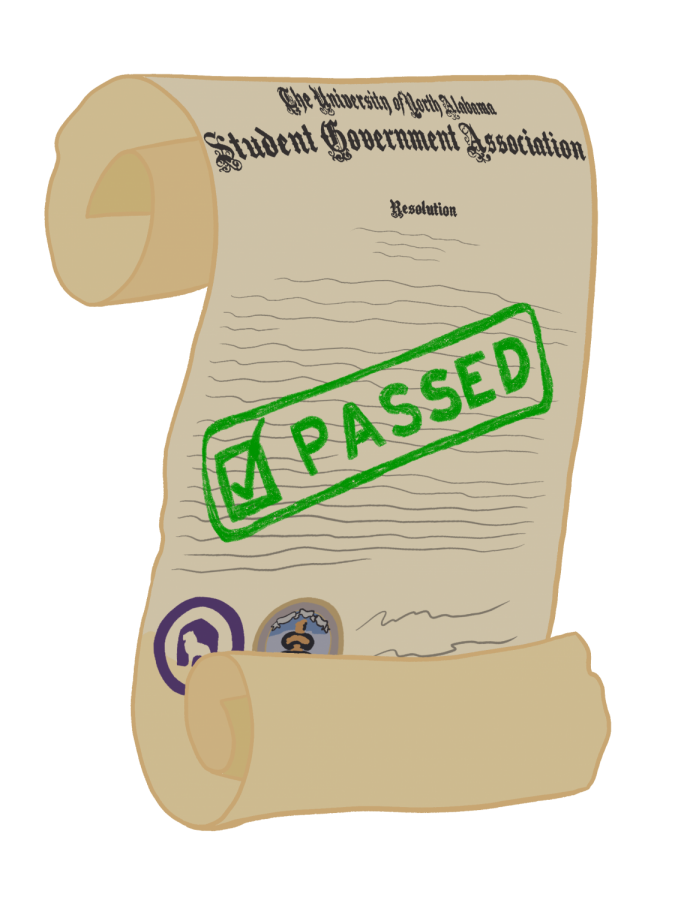Resolution passed for potential UNA app
February 12, 2021
On Jan. 14, Student Government Association (SGA) passed and approved a resolution expressing their support for the development of an app for the University of North Alabama.
However, the university is still looking into the feasibility of creating an app.
“The resolution that SGA passed was a way to show the administration that the students have an interest in an app and that we wish for resources to be allocated to build and maintain one,” SGA Senator Kayla Walton said. “An app is not currently being constructed.”
Walton said it will probably be a while before students see a UNA app.
Before development can occur, a UNA office or outside company needs to be selected to take on the responsibility of building and maintaining an app. In addition to this, the university must also do extensive research in order to identify what students would like to see an app.
In the resolution, it states that a mobile application could benefit students by offering them streamline communication, improving their accessibility to information and increasing student engagement. It could also be used to relay safety notifications to them as well.
“The vast majority of students at UNA have a smartphone that they use every single day,” Walton said. “If designed well, an app could help students efficiently access campus information because an app is made with smartphone users in mind.”
If an app were to be developed, the Technologies Advisory Committee (TAC) would do a lot of the planning.
TAC is a shared governance task-oriented committee that advises the University on technology advancements, and how they can be best used by the university.
Chair of TAC, Micheal Stocz is responsible for organizing the rest of the committee, which is composed of faculty and staff across UNA, to address technology concerns brought up through our shared governance structure.
Stocz said developing a mobile app with integrated platforms is a massive undertaking. Being that he has helped develop a part of a mobile app, Stocz knows that it is not a process that is easy or cheap.
“When we look at higher education as a whole, mobile applications have not had much success in terms of development and/or mass adoption by institution members,” Stocz said. “For example, my previous institutions, attended as a faculty or student, still do not have massively adopted mobile apps. These institutions range in size from less than 2,000 students to over 30,000 students. Seeing some schools in the area, such as the University of Alabama, launch a mobile app is a good starting point for discussions.”
Stocz said if UNA were to proceed with this resolution, we would need to balance a number of developmental and Information Technology (IT) infrastructure related resources to deliver an inherently useful and personalized app for wide adoption.
This resolution still has to work through UNA’s internal Shared Governance structure, which means that there are many individuals associated with the next steps of the resolution process who have either not received the resolution or have not had time to look through it in a meaningful manner.
“I’m not privy to the details of the resolution as of yet, but I can see how [an] app could help students in a number of ways depending on what we integrate it [if] UNA decides to move this resolution to a reality,” Stocz said. “Just know that UNA will take this resolution into careful consideration.”
While a solid plan has not been established, Walton, as the SGA representative on the Technologies Advisory Committee, plans on continuing to pursue this project.
Walton said that she would love to see students in her department of Computer Science and Information Systems get involved in the process of developing an app.
“It could provide students with an opportunity to gain experience and contribute to an interesting project,” Walton said. “We all know that time is the most valuable thing we all have. If we can save some of it [by investing in an app], I believe that would be a great benefit to the students at UNA.”
If any student has ideas about the app or any questions, they are encouraged to go to una.edu/sga and fill out a student feedback form.
SGA Senate meetings take place every Thursday at 3:30 p.m. in the SGA Chambers that are located in the Guillot University Center (GUC). These meetings are open to the public and are a place where any student can voice their concerns.













